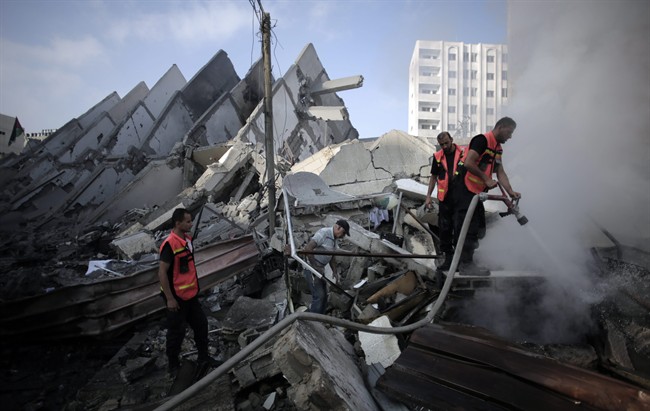JERUSALEM – Israel and the Gaza Strip are bound by much more than enmity: Israel controls nearly everything that comes in and out of the territory, including food and energy, and sometimes allows Gazans to enter the country for medical care.

But following a bloody 50-day war over the summer, a decision to allow the daughter of a top Hamas official to receive care at an Israeli hospital is proving to be too much for some Israelis. The treatment of Ismail Haniyeh’s daughter has sparked a debate over whether Israel’s stated commitment to providing humanitarian aid should be extended to its bitterest enemies.
Haniyeh, who served as the prime minister of the Hamas government in Gaza, is one of Israel’s greatest foes. He frequently calls for Israel’s destruction in fiery sermons and drew international criticism for praising Osama bin Laden as a “martyr” after he was killed by the U.S. in 2011.
Haniyeh’s daughter “shouldn’t have been treated,” commentator Avishai Ivri said on the Army Radio station Tuesday. “She should have been arrested for war crimes.”
READ MORE: Egyptian state television: $5.4B pledged for Gaza reconstruction
Few details of the case have been made public. Tel Aviv’s Ichilov Hospital confirmed this week that a daughter of Haniyeh was treated for “a number of days” earlier this month. It gave no details on her condition, or even her name or age.
But many Israeli commentators defended the decision to treat the daughter in ethical terms.
“I think the state of Israel, in line with the values it espouses, has an obligation to assist people in need, to provide them help,” said Nachman Shai, an opposition lawmaker and former chief spokesman for the Israeli military. He said that while it was possible Israel might have used the case for public relations gain, it nonetheless did the right thing.
Israelis often portray their country as a rare bright spot in a dark region. The nation’s leaders proudly describe it as the Middle East’s only democracy and routinely call Israel’s military “the most moral army in the world.”
But this image has taken a beating in recent years as the country comes under growing international criticism for its continued control over millions of Palestinians and its settlement policies in the West Bank. It faced a stiff test during the summer war, in which more than 2,100 Palestinians were killed, including hundreds of civilians, according to U.N. figures. The U.N.’s Human Rights Council is now investigating whether Israel’s military may have committed war crimes during the fighting.
Israelis overwhelmingly reject such accusations. Israel has accused Hamas of sparking the war by firing rockets into Israel, and says the Islamic militant group is responsible for the heavy civilian death toll because it launched attacks from residential areas, drawing Israeli retaliation. Israelis also note that the country withdrew from Gaza in 2005, though it still controls the territory’s airspace, coastline and major cargo crossings.
READ MORE: What you need to know about the Israel-Hamas ceasefire agreement
In a statement, Maj. Gen. Yoav Mordechai, the military commander in charge of movement of civilians in and out of Gaza, said Israel “does not discriminate” in its treatment of people.
For years, even at times of heightened tensions, Israel has taken in several dozen Gazan patients for medical care. Permits are granted based on security and health considerations, and are usually given to cases in dire and life-threatening conditions. Hatem Moussa, an Associated Press photographer who was critically wounded in an explosion during the summer war, has been treated at Israel’s Hadassah Medical Center since the incident.
Israel’s obligation to help is linked to the control it exercises over Palestinian territories – directly in the case of the West Bank, and through its imposition of a blockade in the case of Gaza. Rights groups and Palestinians also say that Israel often uses offers of medical care and travel permits for political gain or even extortion in order to enlist informants.
“It is clear that for historical reasons particularly in Gaza both also in the West Bank, there is a lack of adequate medical infrastructure. We believe that Israel has an obligation to provide care for people from these areas, because it exercises control over them,” said Hadas Ziv of Physicians for Human Rights-Israel.
Ahmed Yousef, a senior Hamas official in Gaza, said Haniyeh was left with little choice. He said the girl’s case was life-threatening, and with Gaza’s borders virtually sealed by Israel and Egypt, there was no other place to go.
“If you are on the verge of death, and your enemy is the only one to treat you, of course you will resort to him,” he said. “Children of Hamas leaders are human beings.”
—
AP correspondent Mohammed Daraghmeh in Gaza City, Gaza Strip contributed to this report.



Comments